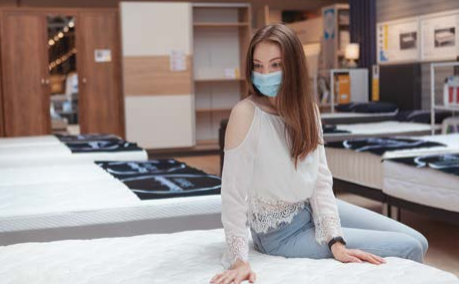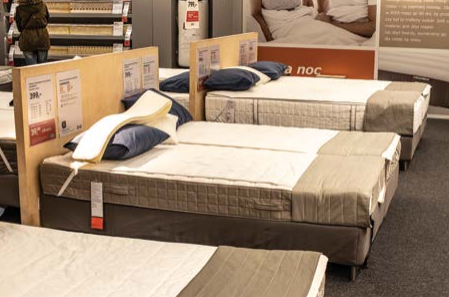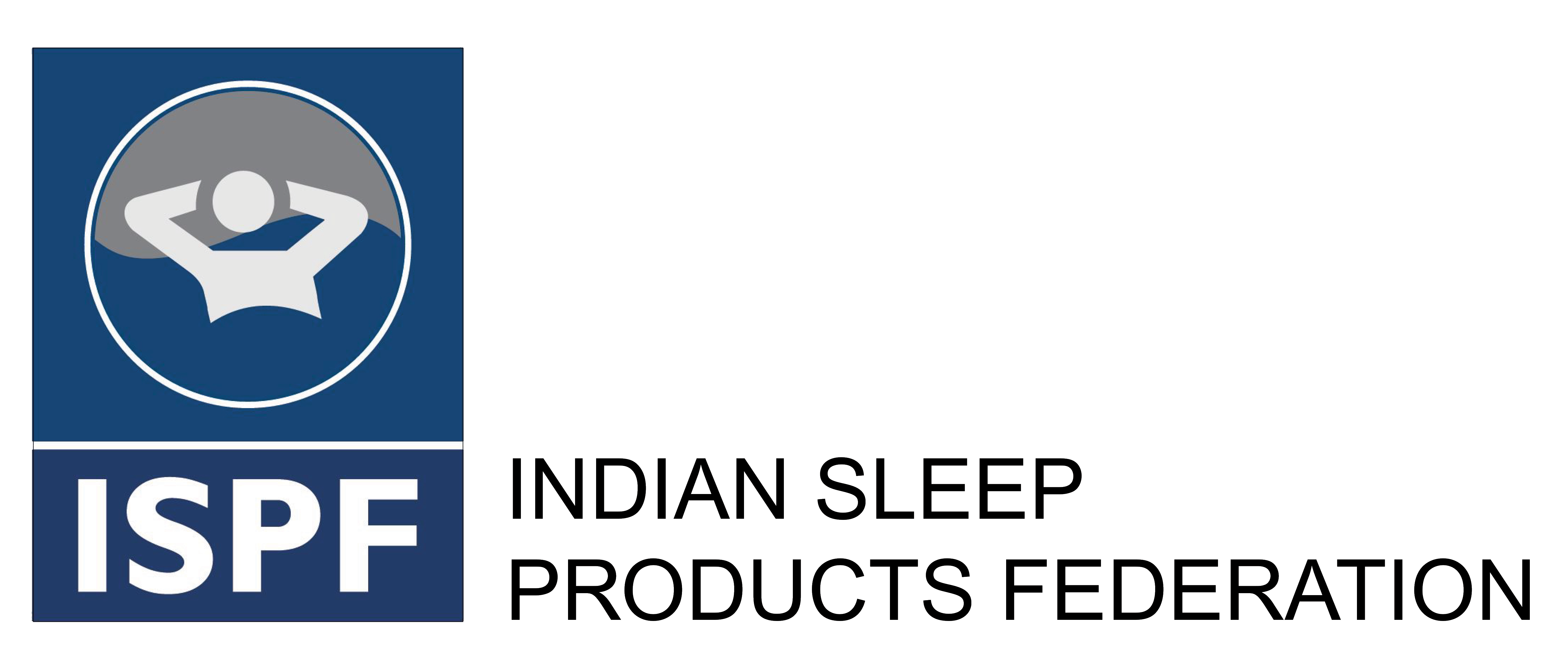The sleep industry helped Government to fight the pandemic
With the rapid spread of the COVID-19, mattress companies in India acted responsibly towards communities and society. The main goal of the sleep industry was to contribute to public safety, support the government, serve citizens and promote well-being.
The Covid pandemic has come came as a bolt from the blue, taking everyone, including governments, industries and
people, by surprise. There has been an economic, social and psychological impact of the Coronavirus on people and economies across the world.
When the pandemic struck in March last year in India, the Central and State governments were not prepared as they did not know the extent and speed of its spread. Overnight, the demand increased for hospitals, hospital beds and medicines.
The government scrambled to tackle the coronavirus as it spread from state to state, making India the second country in the world with the highest number of infections. As the government struggled, it looked for several industries to bail it out of the difficult crisis, one such was the mattress industry.
As the demand for hospital admissions rose, so did the need for hospital beds, and specialized mattresses to cater to a surging number of patients. Rising up to the task, the mattress industry delivered and ensured an increased and steady supply of mattresses to needy hospitals, clinics, health centres and individual homes across the country.
Overcoming obstacles
The ISPF members delivered despite a lack of staff and restrictions on the movement of vehicles due to Covid related regulations across state and district borders. The industry had to cope and work with raw material companies, logistic companies, and reduced staff strength, as many employees had fallen sick due to Covid and government restrictions on the number of people who could work at a unit. Despite these hardships, the mattress industry did help the government tide over the crisis during the first wave of the pandemic, which extended till April of this year, and also during the second wave, which seems to be petering out now.
Mattresses became an important part of government strategy to tackle the pandemic as an insurmountable number of cases had officials struggling. The most important aspect of hospitalization, whether it is during the pandemic or otherwise, is the bed, or more specifically, the specialized medical mattress. Hospitals need mattresses that are suitable for multifunctional beds and are anti-bacterial to help patients recover faster.

Sleep Industry contribution of mattress
ISPF initiatives
With the rising need, the ISPF member companies had to increase production and make do with the available raw materials and reduced staff strength. Though there was a restriction on the number of employees at a workplace in most states with a majority of governments insisting on the presence of only 50 percent staffers at a particular unit, the industry rose up to the occasion and delivered. Both the organized and unorganized sectors grew during the pandemic. As people stayed at home and also the majority of those infected chose to quarantine themselves at home, the need for branded mattresses went up as awareness increased among the population.
“There was an increase in demand for beds from hospitals, especially those run by the government. These are difficult times, and we did increase production to cater to the demand. Even for us, it was a service to the nation, as the ravaging pandemic was and continues to claim lives and infect a large swathe of the population. Our unit went into capacity production as the demand was huge. Like in most places and industries, we too struggled to meet delivery deadlines because we too were affected by the same difficulties faced by units across sectors,” said S. Sundaresan, secretary, ISPF.
“We delivered disposable mattresses to hospitals and PHCs at affordable prices, helping the government fight the pandemic. In case of a death of a patient, the mattresses were incinerated. In the case of an infected patient, who recovered and was discharged from the hospital, we manufacture mattresses that could be reused after disinfection. We used specialized material, like rexin, as the top layer, which could easily be cleaned. I feel, as an industry, we did a great job of delivering these critical essentials to the health sector,” said Sundersan.
Asked if the ISPF members faced difficulties in delivering the consignments due to the pandemic, a slump in the economy and other factors, he said, “Of course yes. It became difficult for us as we had retrenched staff and the government too had placed restrictions on the number of employees that could work at a manufacturing unit. When the demand rose and orders from the government increased manifold, we had to make do with the available staff and start manufacturing at a furious pace. Sales through the retail sector were difficult as business establishments had been ordered by the government to down shutters. But online sales, which have seen a boom over the last few years, came to our help and aided us in making the deliveries.”
A host of Indian bedding companies came forward to help hospitals treating Covid-19 patients by supplying required mattresses and other medical supplies.
Pressure on manufacturers
The ISPF member units assumed the importance of being an essential industry as it was a critical cog in the wheel of battling Coronavirus for the Central and state governments. The demand was also big as mattresses were not reused but incinerated after a COVID patient got discharged or, in an unfortunate incident, passed away. Amidst all this, the manufacturers faced the difficulty of moving their finished products from one state to another as most local governments had declared a lockdown and banned the movement of vehicles to prevent the spread of the virus. The situation improved a little after most states allowed goods vehicles to ply as it was essential for cash-strapped
governments to generate revenues and also cater to the basic needs of the people.
Though wracked by its own problems due to the impact of the pandemic, the ISPF members continued to help the government. It did the yeoman service of supplying critical material, the mattress, to hospitals and homes. The mattresses that sold the most were anti-viral ones as they don’t let the microbes settle in. It is medically proven that these mattresses help patients recover faster.
The comfort factor too was important as many patients got admitted for longer periods at hospitals, with an average hospital stay ranging between a week and a fortnight. It was essential that they had a good night’s sleep, which again helps the body fight infections better.
Sleep industry, kept wheels turning in the pandemic situation and it did come out with flying colours, contributing to the government’s efforts

Bed and the sleep mattress
Self motivated
The significant point was the service motto of the industry that came to the fore during the most devastating health crisis to have hit the present generation. Many manufacturers had to up their game to provide suitable mattresses to the health sector. “These are difficult times. The entire health industry — be it the pharmaceutical and medical equipment manufacturers or related industries like mattress production units – improved their abilities several notches to tackle the pandemic. It was a remarkable feat, but at the same time exhausting and mind-numbing too,” said a medical practitioner, working with a prominent hospital chain.
A number of studies have been published as to how the pandemic affected the sleeping patterns of people. As the stress and the fear of infection took a toll, many people were finding it difficult to enjoy a goodnight’s sleep. The last two years are probably the maximum amount of time spent by a maximum number of adults at their homes. They had to change the way they worked, as they had to work from home, and interacted with their families, as they were all holed up for days on end inside their homes. It did take a psychological toll too on individuals, affecting their sleep.
In one such study, Royal Philips, a global major in health technology, conducted a sleep survey – “Seeking Solutions: How COVID-19 Changed Sleep Around the World”. Almost a year since the onset of the COVID-19 pandemic, Philips surveyed 13,000 adults in 13 countries to capture attitudes, perceptions, and behaviours around sleep. 70 percent of people surveyed had experienced one or more new sleep challenges since the start of the pandemic. 72 percent of surveyed sleep apnea patients who discontinued CPAP therapy cited Covid-related reasons. 58 percent reported a willingness to use telehealth for a sleep-related concern.
Before the mental health issues too grew into a crisis, the Indian sleep industry stepped in. It was another problem that was tackled successfully by the sector.
Awareness making difference
The industry, which has seen a healthy 10-12 percent growth over the last three years, also contributed to the economy by keeping its manufacturing units running. The revenues generated helped the government shore up its resources. Though the brick-and-mortar retail business was shut across the country, what helped the sector was online sales. It was in tune with the general trend among users, as there has been reduced hesitancy to buy high-end products through e-marketing platforms. As people cut down on their travel and other recreational expenses, with restrictions on travel, cinemas and restaurants, they focused on redoing their homes and investing in products for comfortable living, including better mattresses.
On the general trend in the market, an expert said that the growth that the industry has seen is because of the increase in awareness. “The people know the importance of a good mattress. The industry too has highly specialized to cater to the needs of the customer. We do have mattresses for athletes, the elderly and those suffering from specific medical conditions. With the technology advancing, we can build custom-made mattresses only for children — who need smaller sized beds, policemen — who stand for long hours in the line of duty, and others,” he said.
People too are aware that they have to change their mattress once every five years. That is because there is a lot of shedding of skin and other matter from the body and fluids on the mattress. These accumulated over the years and could lead to skin infections and other health complications.
In conclusion, it was a trial by fire for the ISPF members, as it had to keep wheels turning in the face of near insurmountable problems. But in the end, it did come out with flying colours, and at the same contributed to the government’s efforts.

